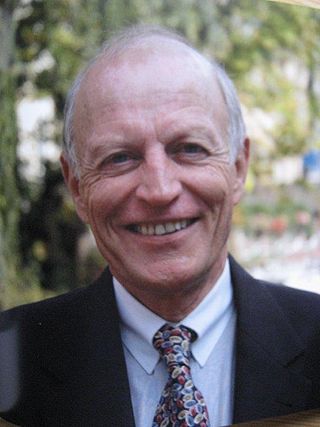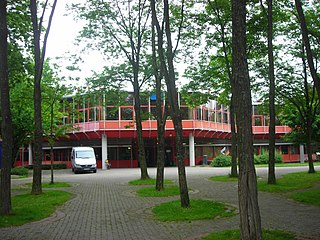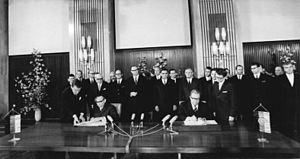BRD is an unofficial abbreviation for the Federal Republic of Germany, informally known in English as West Germany until 1990, and just Germany since reunification. It was occasionally used in the Federal Republic itself during the early Cold War; it was commonly used between 1968 and 1990 by the ruling party of the German Democratic Republic, resulting in a strong deprecation of its use in West Germany. The East German regime had previously used the term "German Federal Republic", which it abbreviated as "DBR", to refer to West Germany. The most widely used abbreviation for West Germany in the country itself was its ISO 3166-1 alpha-2 country code "DE", which has remained the country code of reunified Germany.

Karl-Hermann Flach was a German journalist of the Frankfurter Rundschau and a politician of the liberal Free Democrats (FDP).
The Basic Treaty is the shorthand name for the Treaty concerning the basis of relations between the Federal Republic of Germany and the German Democratic Republic. The Federal Republic of Germany and German Democratic Republic (GDR) recognized each other as sovereign states for the first time, an abandonment of West Germany's Hallstein Doctrine in favor of Ostpolitik.
Neues Deutschland is a left-wing German daily newspaper, headquartered in Berlin.

Rundfunk der DDR was the collective designation for radio broadcasting organized by the State Broadcasting Committee in the German Democratic Republic (GDR) until German reunification in 1990.

The Velodrom (velodrome) is an indoor track cycling arena, in the Prenzlauer Berg locality of Berlin, Germany. Holding up to 12,000 people, it was also Berlin's largest concert venue, until the opening of O2 World in 2008.

The old states of Germany is a jargon referring to the ten of the sixteen states of the Federal Republic of Germany (FRG) that were part of West Germany and that unified with the eastern German Democratic Republic's 5 states, which are given the contrasting term new states of Germany. Usage of this terminology usually excludes one other state, Berlin, conterminous with the capital city of the reunified nation which used to be divided, with its western part linked with West Germany.

Horst Möller is a German contemporary historian. He is Professor of Modern History at the Ludwig Maximilian University of Munich (LMU) and, from 1992 to 2011, Director of the Institut für Zeitgeschichte.
Fiete im Netz is a 1957 East German drama film.

Throughout their existence East Germany and the Soviet Union maintained close diplomatic relations. The Soviet Union was the chief economic and political sponsor of East Germany.

Dieter Mahncke is a scholar of foreign policy and security studies, and Alfried Krupp von Bohlen und Halbach Professor Emeritus of European Foreign Policy and Security Studies at the College of Europe. He is the author of books and articles on European security, arms control, German foreign policy, Berlin, US-European relations and South Africa.

There are five French-German secondary schools known in German as Deutsch-Französisches Gymnasium (DFG) and in French as lycée franco-allemand (LFA). Mixing students, teachers and teaching methods of both countries, DFG/LFAs are highly selective schools of excellence. Their teachers are paid by the French and German states, and tuition is free of charge.

The DFG / LFA Freiburg is a DFG/LFA, a public French-German secondary school in Freiburg im Breisgau, Germany. It offers free education from grades 5 through 12.
The Taipei Representative Office in the Federal Republic of Germany; represents the interests of Taiwan in Germany in the absence of formal diplomatic relations, functioning as a de facto embassy.
Bertram Wieczorek is a German physician and former politician (CDU).

Christa Luft is a German economist and politician of the SED/PDS. Luft joined the SED in 1958. From 18 November 1989 to 18 March 1990, she was the Minister of Economics in the Modrow government. From 1994 to 2002 she was member of the Bundestag for the PDS.

Germany–Morocco relations date back to the 19th century. The German Foreign Office describes Morocco as a "central partner of the European Union and Germany in North Africa," and Germany is an important trading partner for Morocco. In the past, however, relations have not always been entirely free of tension.

Inner German relations, also known as the FRG-GDR relations, East Germany-West Germanyrelations or German-German relations, were the political, diplomatic, economic, cultural and personal contacts between the Federal Republic of Germany and the German Democratic Republic, at the period of the West-East division in German history from the founding of East Germany on 7 October 1949 to Germany's reunification on 3 October 1990.

Germany–Niger relations focus primarily on cooperation in development, security, and migration policy. Since 2016, bilateral relations have been significantly intensified, with several state visits at the highest level.

As a country with traditionally strong contacts in the Arab world, Germany enjoys a good relationship with Kuwait. Among the EU states, Germany is Kuwait's most important trading partner.














